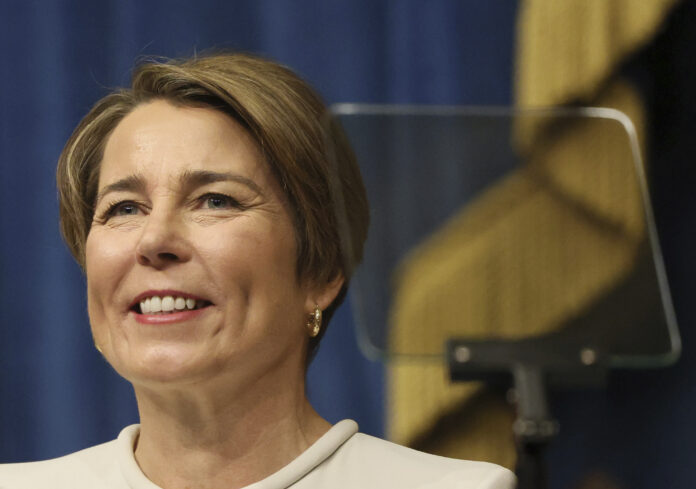
BOSTON (AP) – Gov. Maura Healey unveiled a sweeping $742 million tax relief proposal Monday that she said would provide savings for families, renters, seniors, farmers, commuters and others.
The measures, which Healey announced during a visit to a YMCA in Lynn, Mass., also include proposed changes to the tax code that she said will bring Massachusetts in line with other states, making it a more attractive place to live, work and do business.
The tax measures will be filed with lawmakers Wednesday along with Healey’s first state budget proposal. Both would apply to the 2024 fiscal year, which begins July 1.
Healey said the tax measures were based in part on conversations she and Lt. Gov. Kim Driscoll had while traveling around the state.
“I hear from people who are struggling to get by as the cost of living continues to skyrocket past them — the family watching their grocery bill grow each week, the young mom who wants to return to her dream job but can’t afford child care, the recent college graduate who can’t afford both his rent and student loan payments,” Healey said.
Members of the Massachusetts Senate Republican Caucus sent a letter to Healey last week urging her to adopt tax relief aimed at seniors, renters, lower income families and others.
“We want Gov. Healey to know that we share the priority of enacting tax reforms,” said Senate Minority Leader Bruce Tarr, including changes targeted at the “the high costs of housing, seniors trying to stay in their communities, the escalating price of dependent and child care support, and the substantial economic burdens faced by low-wage earners.”
Healey’s proposal includes a new tax credit that would provide families with a $600 credit per dependent, including children under 13, people with disabilities, and senior dependents ages 65 and older. The tax credit would cost the state about $458 million and help about 700,000 taxpayers.
The measures would also increase the state’s rental deduction — currently limited to 50% of rent up to $3,000 — to $4,000. The change would cost the state about $40 million, while helping offset housing costs for 880,000 renters, she said.
The administration is also proposing doubling the senior circuit breaker credit from $1,200 to $2,400 for low-income seniors with high property taxes or rent, which would help about 100,000 seniors stay in their homes.
The proposal now heads to the Massachusetts House and Senate. Both chambers are controlled by Democrats who will likely make changes before arriving at a single compromise version to send back to Healey.
Healey’s bill would also reduce the short-term capital gains tax from 12% to 5%. Wisconsin and South Carolina are currently the only other states that tax short-term capital gains at a higher rate than long-term capital gains, according to the administration.
The proposal would also eliminate the estate tax for all estates valued at up to $3 million with a credit of up to $182,000. Massachusetts is one of only 12 states that has an estate tax and shares the lowest threshold of those twelve with Oregon, according to Healey. It would reduce the tax burden on smaller estates.
Other elements in the bill are aimed at benefiting dairy farms, encouraging live theater productions, promoting locally produced hard cider, and aiding student borrowers and bicycle commuters.












